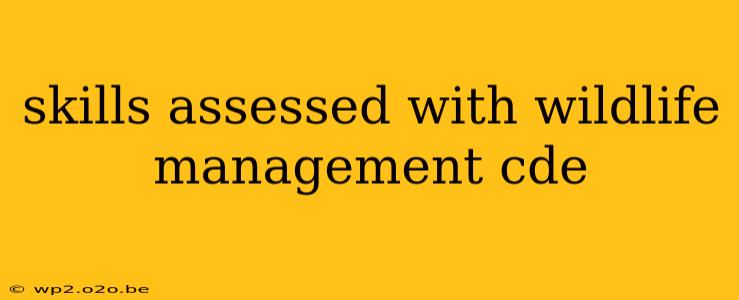Wildlife management is a multifaceted field requiring a diverse skillset. Career Development Events (CDEs) in wildlife management offer students a platform to showcase their expertise and understanding of the subject matter. This guide delves into the core skills assessed during these events, providing a roadmap for students preparing to participate.
Core Skills Assessed in Wildlife Management CDEs
Wildlife management CDEs typically evaluate a range of skills, broadly categorized into:
1. Scientific Knowledge and Application:
- Understanding Wildlife Ecology: This includes knowledge of animal behavior, population dynamics (growth, decline, carrying capacity), habitat requirements, and species interactions. Competitions may involve analyzing data on population trends, identifying limiting factors, or proposing management strategies based on ecological principles.
- Data Analysis and Interpretation: Proficiency in interpreting scientific data, including graphs, charts, maps, and statistical analyses, is crucial. Students need to be able to draw conclusions, identify trends, and support their findings with evidence. This often involves working with real-world datasets related to wildlife populations, habitat assessments, or research findings.
- Research and Problem-Solving: Wildlife management often necessitates addressing complex issues. CDEs assess the ability to formulate research questions, design studies (including sampling methods), analyze results, and propose effective solutions to conservation challenges. This might involve designing a study to assess the impact of habitat fragmentation on a specific species or proposing solutions to human-wildlife conflict.
- GIS and Remote Sensing: Geographic Information Systems (GIS) and remote sensing technologies are integral to modern wildlife management. Competitions may involve using GIS software to map habitats, analyze spatial data, or model wildlife movements. Understanding remote sensing techniques for habitat monitoring and population estimation is also valuable.
2. Management and Conservation Practices:
- Habitat Management: This encompasses understanding various habitat manipulation techniques, such as prescribed burning, forest thinning, or wetland restoration, to improve wildlife habitat quality. Students may be asked to design habitat improvement plans or evaluate existing management strategies.
- Wildlife Population Management: This includes knowledge of population monitoring techniques, harvest regulations (hunting and trapping), and strategies for controlling invasive species or managing overabundant populations. Questions might involve designing a population management plan or evaluating the effectiveness of existing strategies.
- Conservation Planning and Policy: Understanding the legislative framework governing wildlife management and developing conservation plans is essential. Students should be familiar with relevant laws, regulations, and policies and how they impact wildlife populations and management strategies.
- Communication and Outreach: Effective communication is key to engaging stakeholders and educating the public about wildlife conservation. CDEs might involve preparing presentations, writing reports, or participating in debates related to wildlife management issues.
3. Professionalism and Ethical Considerations:
- Professional Conduct: Adhering to ethical guidelines and professional standards is paramount in wildlife management. CDEs evaluate students' understanding of responsible conduct, including data integrity, ethical treatment of animals, and adherence to regulations.
- Teamwork and Collaboration: Wildlife management often involves teamwork and collaboration with other professionals and stakeholders. CDEs may include team-based activities assessing students' ability to work effectively in a group, share knowledge, and achieve common goals.
- Critical Thinking and Decision-Making: Wildlife managers frequently encounter complex situations demanding critical thinking and sound decision-making. CDEs test students' ability to analyze information, consider multiple perspectives, and make informed decisions under pressure.
Preparing for Wildlife Management CDEs
Successful participation in wildlife management CDEs requires dedicated preparation. This includes:
- Thorough Study: Master the fundamental concepts of wildlife ecology, management techniques, and relevant conservation policies.
- Hands-on Experience: Seek opportunities for fieldwork, research projects, or internships to gain practical experience.
- Skill Development: Develop proficiency in data analysis, GIS, and communication skills.
- Practice: Participate in practice competitions and workshops to refine your skills and build confidence.
By focusing on these core skills and dedicating time to thorough preparation, students can significantly improve their performance in wildlife management CDEs and showcase their potential as future wildlife professionals.

